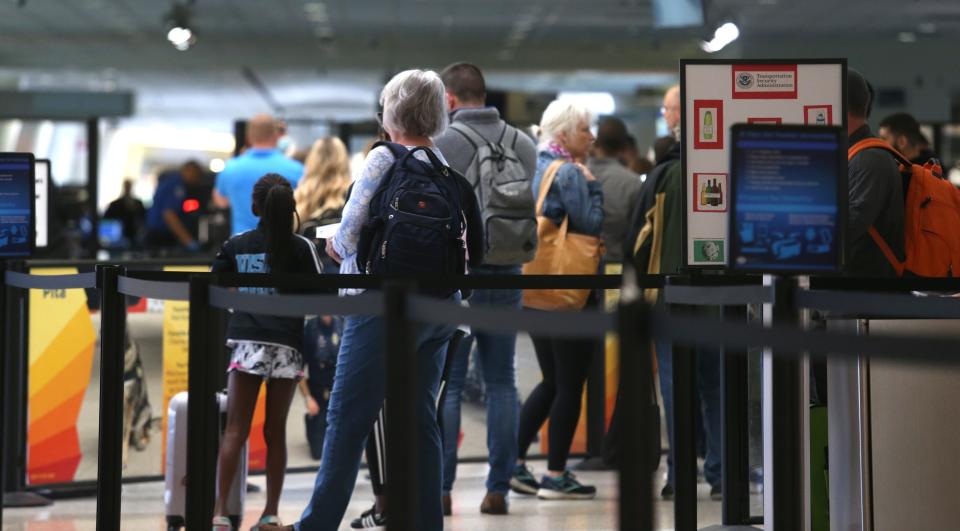On bureaucracy and the ethics of questioning nonsense
Go along to get along, we are instructed on our way to confusing cooperation with compliance. Don’t make a big deal. Don’t waste time. Choose your battles. Sweat not the small stuff.
Alternatively, an old proverb says, “Many a little makes a mickle.” The small things are in the foreground. We put our hands on them day by day. They accumulate. The way we manage these details becomes habit and routine. Prayer and meditation, for those practice them, gain in power through consistent repetition rather than by occasional forceful performance.
How we use ourselves is still seen by some as the development of virtue or at least of wisdom — the means of living well. Thus, the little things are comprised in a mickle, which means a lot (this is where we got the word “much”).
In our time, daily littles include various protocols. As a reporter who sometimes covers courts, I am used to removing my coat and belt but not my shoes (that’s what we do at airports). Some places require masks and some leave it to individual discretion. Sometimes my car stops at a federal checkpoint where I am asked to state my citizenship.

Counting them up, I submit to many of these routines — a mickle, we might say. Some seem more reasonable than others.
Typically I comply, something public schools and middle class parents taught me early. Occasionally I question them. This is somewhat taboo yet the alternative is a creeping automatism we must reject.
On that hand, how do we avoid the folly of becoming “that guy,” the jackanapes holding everyone up in line? Questioning nonsense is an ethical consideration, both in the sense of ethos and of weighing how our actions affect other people.
Recently, somewhere in the distant offices of the sprawling corporation that employs me, somebody decided to add a new step to the series of passwords and affirmations we pass through to use our company-issued computers. It is a gauntlet of passcodes and PINs and two-factor authentications. Many clicks. A mickle of them. We might call that a clickle.
The latest addition is a screen reminding us that our computers and activities are subject to monitoring lest we get up to any mischief. This is not a new policy. We review the company handbook on cybersecurity, uses of technology and employee conduct annually, affirming that we have reviewed and understood the rules. Now we are required to affirm it, with one more click, every time we start up or reboot our devices.
Suspecting humbug, I questioned the need for this and got a funny look from my manager. “I saw that, clicked on it, and forgot about it,” he said, implying I might do the same. Who can blame him? We have things to do on the other side of the gauntlet. Just pass the gates! Don’t make a mickle out of a molehill.
While talking it through, I remembered an important point in the ethics of interrogating nonsense: Questions before conclusions.
After some whimsical online chats with tech support — who patiently explained how to click an “OK” button but were flummoxed by “why” questions — I was contacted by the company’s new head of information and security review, who politely asked what I was fussing about.
Instead of harrumphing I posed a question: Is there a new problem that is solved by the addition of this extra message and mandatory response? Would you help me understand?
I waited with an open mind for an answer. Days later, none has been offered. They might be too busy, or there might not even be a clear reason. We know this about large bureaucracies: Sometimes maintaining the system is the point of the system.
It might seem nonsensical but at least I asked. I have not yet suffered the fate of Robert DeNiro’s character in the nightmarish film, “Brazil,” who has so many forms stuck to him that his body vanishes in a flurry of paper.
There is wisdom in releasing matters out of our control. At the same time, questioning the little things is an exercise in ethics, because to be human we must keep learning while retaining the spirit to identify nonsense.
The littles add up; and how we manage the mickle becomes who we are.
Algernon D'Ammassa can be reached via adammassa@lcsun-news.com or @AlgernonWrites on Twitter.
More littles and mickles from Desert Sage:
Instead of hanging up, I challenged a scam caller. He started to sing.
Who's afraid of the big bad Musk? Bid to buy Twitter sparks panic
Creating the cannabis shopping experience is a step toward normalization
This article originally appeared on Las Cruces Sun-News: On bureaucracy and the ethics of questioning nonsense

